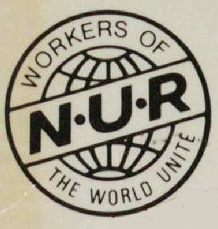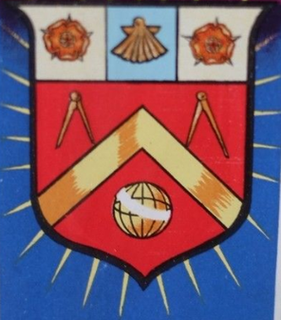In British politics, an affiliated trade union is one that is linked to the Labour Party. The party was created by the trade unions and socialist societies in 1900 as the Labour Representation Committee and the unions have retained close institutional links with it.

The Transport and General Workers' Union was one of the largest general trade unions in the United Kingdom and Ireland – where it was known as the Amalgamated Transport and General Workers' Union (ATGWU) to differentiate itself from the Irish Transport and General Workers' Union – with 900,000 members. It was founded in 1922 and Ernest Bevin served as its first general secretary.

The National Union of Railwaymen was a trade union of railway workers in the United Kingdom. The largest railway workers' union in the country, it was influential in the national trade union movement.

The Ceramic and Allied Trades Union (CATU) was a trade union representing pottery workers in the United Kingdom.

The Amalgamated Engineering Union (AEU) was a major British trade union. It merged with the Electrical, Electronic, Telecommunications and Plumbing Union to form the Amalgamated Engineering and Electrical Union in 1992.

The Amalgamated Society of Railway Servants (ASRS) was a trade union of railway workers in the United Kingdom from 1872 until 1913.

The Amalgamated Society of Woodworkers (ASW) was a British trade union representing carpenters, joiners and allied trades. The ASW was formed in 1921 by the amalgamation of two smaller unions. It was itself merged into the Union of Construction, Allied Trades and Technicians in 1971.
The National Union of General Workers (NUGW) was an early general union in the United Kingdom, the most important general union of its era.
The National Amalgamated Union of Labour (NAUL) was a general union in the United Kingdom.

The Amalgamated Society of Boilermakers, Shipwrights, Blacksmiths and Structural Workers (ASB) was a trade union in the United Kingdom. Many of its members worked in shipbuilding, in which industry it was the leading trade union, while over time it also developed strength in engineering and construction.
The United Patternmakers Association (UPA) was a trade union in the United Kingdom.
Edward James Hill, Baron Hill of Wivenhoe, known as Ted Hill, was a British trade unionist. Known as a shrewd negotiator, Hill frequently succeeded in "wresting many concessions from unwilling employers."
The National Amalgamated Furnishing Trades Association (NAFTA) was a trade union representing workers involved in making furniture in the United Kingdom.
William Frank Purdy was a British trade unionist.
The National Union of Foundry Workers (NUFW) was a trade union representing workers in foundries in the United Kingdom.
The Associated Blacksmiths, Forge and Smithy Workers' Society (ABFSWS) was a trade union representing metalworkers in the United Kingdom and Ireland.
This article lists the Labour Party's election results from the 1922 United Kingdom general election to 1929, including by-elections.
John Willcocks was a British trade union leader.
Sydney Ombler was a British trade unionist.
Arthur Williams was a British trade unionist.







